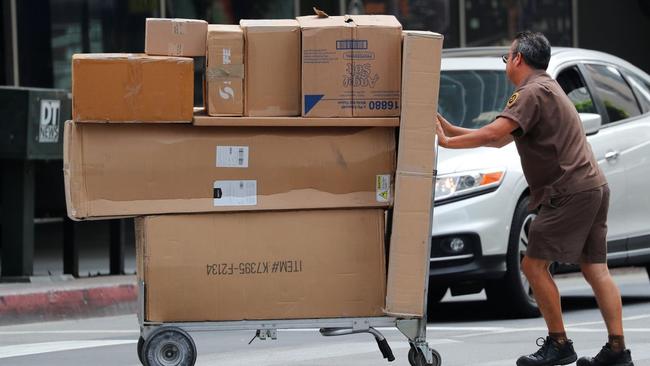Australian business anger at cheap China postage
Calls grow to rewrite a UN pact which means shipping online goods from China is cheaper than from local firms.

Australian businesses continue to suffer under a United Nations agreement which means shipping of online goods is cheaper from China than from local suppliers, an inquiry has been told.
In a submission to a Senate inquiry about Australia Post’s delivery standards, Small Business Ombudsman Kate Kate Carnell criticised the Universal Postal Union (UPU) rates, which aim to ensure all its member countries can afford international postage.
Under the agreement, China is classified as a developing country, meaning it pays a cheaper rate of postage than countries including the United Kingdom and Australia, despite being the world’s second biggest economy and home of the world’s biggest e-commerce company, Alibaba.
It means buying online from China can be cheaper than getting a comparative item from an Australian seller.
“My office has received a number of complaints from small businesses regarding the price competitiveness of domestic parcel delivery as opposed to international parcel delivery for same or similar products,” Ms Carnell said.
“For example, a product sold and shipped from a seller may attract free or low-cost delivery (eg $5). The domestic cost for the same product, shipped to the same location, from an Australian small business, could be double that of the international seller.”
Ms Carnell called on Australia Post to renegotiate its UPU agreement terms so Australian small businesses could compete on a level playing field and help the recovery from the coronavirus pandemic.
“As Australian Post is a UPU member, prices for the transport of parcel and letters of foreign origin is constrained by the UPU agreement and Australia Post cannot set parcel prices to reflect their actual costs.
“We recommend Australia Post renegotiate their UPU agreement terms or implement a fee on all incoming international parcels to establish equity in shipping costs.
“This will assist Australian small businesses to gain more footing in the online retail market, which has seen a boom during the crisis, and contribute to Australia‘s overall economic recovery.”
It is not the first time the UPU structure has been criticised. Two years ago, US President Donald Trump threatened to withdraw from the organisation, founded in 1874, saying it unfairly favoured China.
He gave the UPU a 12-month deadline to find a solution or the US would leave - a move which many feared would create chaos in global logistics, disrupting mail deliveries.
This led to an extraordinary congress among the UPU’s 192 members in Geneva last September where they agreed to allow the US to set its own postal rates from July 2020.
Other countries will be allowed to set their own rates within a five-year period from 2021.
A Senate inquiry is set to begin into Australia Post’s delivery standards next week. It follows the government allowing the postal service to deliver mail every other day in cities and extend deliveries on some routes to help combat the coronavirus pandemic.
Labor and the Greens are seeking to overturn the changes, which will be reviewed in June next year, with opposition communications spokeswoman Michelle Rowland labelling the temporary reforms a hoax. Ms Rowland said when Australia Post requested government assistance in March, addressed letter volumes were an estimated 4 per cent above trend for that month.
Meanwhile, the government confirmed last week that Australia Post’s overall revenue had tracked higher than budget in March and April, due to an online shopping bonanza.
But Australia Post costs have also risen, as it set up 16 temporary parcel delivery centres and chartered flights to deliver the surge in online shopping orders.
As part of the senate inquiry, Ms Carnell recommended parcel delivery costs be legislated, saying while competition in metropolitan areas kept costs low, rural and regional areas remained disadvantaged where Australia Post was the only parcel delivery service.
“The cost of letter delivery is regulated by the Act; however, the same does not apply to parcel delivery. This has resulted in seemingly arbitrary pricing structures, with a lack of competition in rural and remote areas often driving prices higher,” Ms Carnell said.
“Similarly, businesses who ship large volumes of parcels are offered a ‘bulk discount’, with the cost of the discount presumably borne by those who ship in smaller quantities. This disproportionately impacts small and start−up businesses.
“Legislating the cost of parcel delivery will provide further clarity, and assist to level the playing field for small businesses.”




To join the conversation, please log in. Don't have an account? Register
Join the conversation, you are commenting as Logout